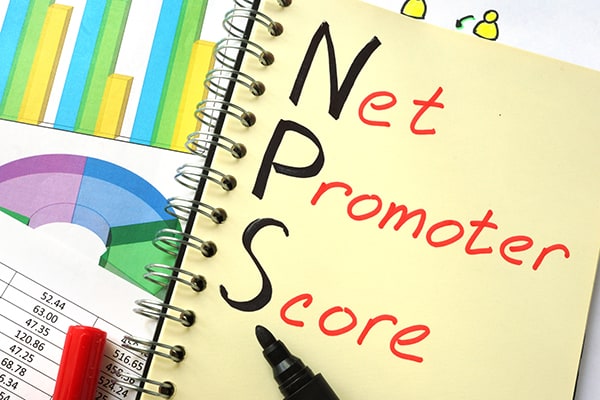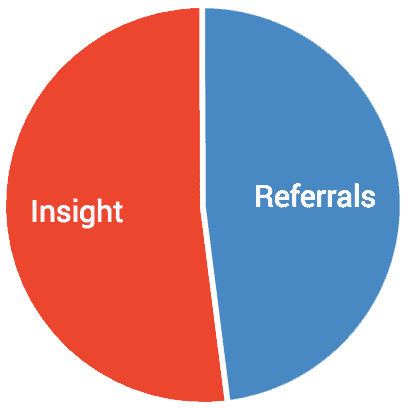

Confession… I’ve never really liked the Net Promoter Score®, or NPS® for short. Like you, I’ve been on the receiving end of this survey a countless number of occasions.
Sometimes I answered it. Sometimes I didn’t.
Why didn’t I answer it, though? It’s a simple enough question…
How likely is it that you would recommend [brand] to a friend or colleague?
Then, of course, the expectation is that I would give an answer on a scale of 1 to 10.
NPS Refresher— How to Calculate
According to Satmetrix Systems, the trademark holder of the Net Promoter Score, respondents are grouped as follows:
- Score 9 or 10 — These are “Promoters” who will fuel your growth. They’re loyal enthusiasts who will keep buying from you and refer others to your business.
- Score 7 or 8 — These “Passives” are satisfied customers, but unenthusiastic and vulnerable to competitors.
- Score 6 or less — These are “Detractors” who are unhappy and can damage your brand. Your growth can be impeded through negative word-of-mouth.
To calculate your NPS, simply subtract the percentage of Detractors from the percentage of Promoters. For instance, let’s say your survey returned the following results:
- 73% Promoters
- 19% Passives
- 8% Detractors
In this case your NPS would be 65% (73% minus 8%).
In theory, you would measure this over time and try to improve the ratio of Promoters to Detractors. Sound good and dandy?
Not so fast.
When the NPS Sucks
I believe the effectiveness of the Net Promoter Score depends on what your goals are.
If you set out to measure future business growth or the likelihood of referrals, then great… the NPS is a fantastic survey question to use.
On the other hand, if you want accurate insight into customer satisfaction, in my humble opinion, use a different survey question.
Stick with me here; I have my reasons why.
Whenever I’ve seen the NPS question, I’ve often felt uneasy about answering it. It wasn’t until I started RevenueJump (excellent feedback software, btw) that I understood why.
The NPS survey seemed like a loaded question. “If I give a high score, the company is going to ask me for a referral. If I give them a low score, I’m not being truthful,” I thought. Maybe this was their goal and I was justified in my “fear.” I could never quite tell.
So, more often than not, I wouldn’t answer the question at all.
Looking back, I was probably over-thinking it, especially since I do this type of thing for a living!
However, I couldn’t help but wonder if there’s a subliminal message being conveyed by the NPS question.
This is why I set out to test my theory with data.
A Survey of a Survey
The reality is, some customers will never refer, no matter how satisfied they are. In other words, the customer could be 100% happy with a company, but 0% likely to recommend them. In this case, do they give the company a score of 1, per the survey instructions? Or maybe they just skip it altogether?
This means the NPS is skewed from the start!
Digging a little deeper, we recently completed a lengthy survey of adults and asked them a simple question of our own:
Why would a company ask you this: “How likely is it that you would recommend us to a friend or colleague.”
 Of the 513 people who responded, 42% of them felt a company was using this question to ask “for referrals” as opposed to asking “for insight.”
Of the 513 people who responded, 42% of them felt a company was using this question to ask “for referrals” as opposed to asking “for insight.”
For us, 42% was a big chunk… too big if the goal is to measure customer satisfaction. As a result, I felt justified about not fully trusting the Net Promoter Score.
Other Unanswered Questions
Although our study reveals the implications of using the NPS question, I seem to have even more questions that I want answered.
- Is there something other than referrals and insight that recipients think the NPS question is asking for?
- In our study, we were only comparing the two.
- If the goal is to measure the customer experience, what question(s) would be better to use?
- With its flaws, why is the NPS so prevalent?
As I perfect the RevenueJump platform, I will continue to work on answering questions like these with future studies and split tests.
My opinion of the effectiveness of the Net Promoter Score depends on the application. What goals are we trying to reach? While I respect that it’s widely accepted and not going anywhere, I would like to use it in the most effective manner possible.
Thanks for reading,
Brodie





